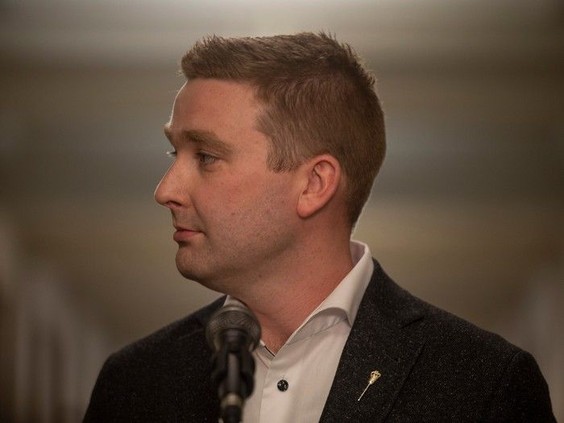
“I’d say we’ve made progress in both these last rounds of bargaining, to come to those tentative agreements,” said Minister Jeremy Cockrill on Friday.
Larissa Kurz
Regina Leader-Post
Teachers and the province remain at odds over next steps as a narrow refusal of the latest contract offer prompts calls from the minister of education for binding arbitration.
Teachers cast their ballots over two days this week, with results Thursday revealing that 55 per cent of those who did vote opted to reject the offer.
The previous contract offer was also turned down, by a much larger margin of 90 per cent.
Minister of Education Jeremy Cockrill called the results “disappointing” before he declared that government is now willing to enter into binding arbitration as the next step, if the teachers’ bargaining committee (TBC) will agree.
“We’re disappointed with the vote results from yesterday … but now we must find a new path forward. That path is binding arbitration,” said Cockrill on Friday from Saskatoon.
“Binding arbitration will provide clarity for parents, students and teachers that there will be no further job action this school year and end of year field trips, exams and graduations can go ahead as planned.”
The government-trustee bargaining committee (GTBC) was to issue an invitation to the TBC to discuss the arbitration process Friday morning.
Saskatchewan Teachers’ Federation (STF) president Samantha Becotte said she would refrain from answering the call until it has been formally considered. However, the TBC would prefer to return to the table and resume negotiations first.
“Over the last five days that we have met, there was a (positive) change in tone,” Becotte said Friday. “If they’re not willing to engage in those conversations and have that good faith, back-and-forth conversation, then binding arbitration could be an option for a path forward.”
A parallel invite was sent to the GTBC on Friday to resume bargaining with a renewed mandate. If the GTBC doesn’t respond, Becotte said sanctions would resume “in short order,” with 48-hour notice.
Binding arbitration would send the dispute to a neutral third-party arbitrator who considers both parties’ submissions and provides recommendations on how to resolve the impasse.
Amendments to the Education Act in 2017 made it a requirement that both parties agree to arbitration before it can be engaged. Cockrill rejected the STF’s call for such an agreement in March.
“At that time I didn’t feel we had spent enough time actually bargaining to go to binding arbitration,” he said Friday. “I’d say we’ve made progress in both these last rounds of bargaining to come to those tentative agreements.”
Becotte agreed, saying the TBC wants to continue exploring the positive momentum created at the table during talks over the week of May 17.
Further, she said binding arbitration is a “fair judicial process,” but one that doesn’t allow teachers a final vote on the results.
“We do want to provide that opportunity,” Becotte said.
The tentative agreement rejected this week had been endorsed by STF executive. Becotte acknowledged it didn’t solve all classroom issues but offered “positive steps” forward in improving conditions.
It included an eight-per-cent salary increase over three years, plus a one-per-cent market adjustment. It also promised a task force on classroom complexity and a grievable accountability framework for a memorandum of understanding to deliver increased annual funding for classroom complexity, among other non-monetary items.
“I’m not surprised teachers were frustrated around these items,” said Becotte, adding “there simply wasn’t enough there” to satisfy membership.
“We’re talking about providing a basic level of services to our students,” she said, citing class sizes and “timely access” to mental health counsellors and educational psychologists as examples.
Becotte said this week’s vote is to be interpreted as “a message to government that teachers have little trust in their commitments.”
“Teachers are smart, they are incredibly critical, and they’ve been living with these conditions… for more than a decade,” she said. “We are united in the fight to ensure that public education becomes and remains a priority for this government.”
Saskatchewan NDP education critic Matt Love also encouraged the province to “get back to the table” before engaging in any escalated resolution mechanisms.
“Minister Cockrill has said time and time again that the best deals are made at the bargaining table, and so I think he should listen to his own advice,” said Love.
In March, the Opposition had joined the STF in calls for binding arbitration.
Binding arbitration was last used in 2018 during negotiations for a collective agreement with teachers that began in 2017.
lkurz@postmedia.com

